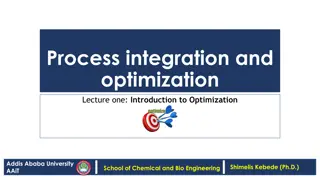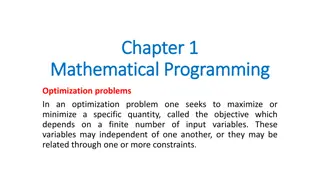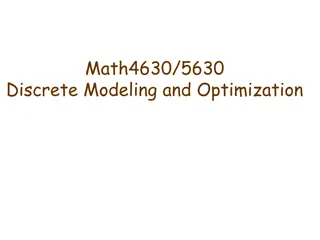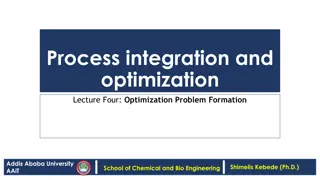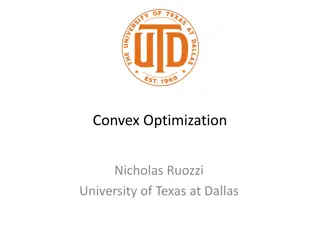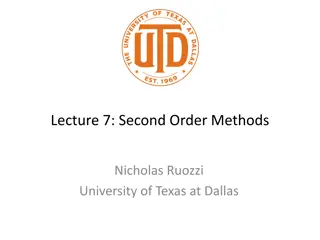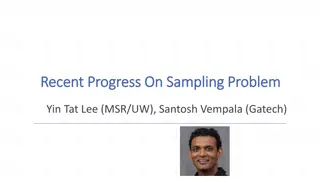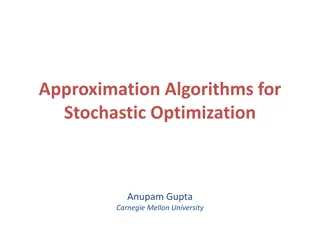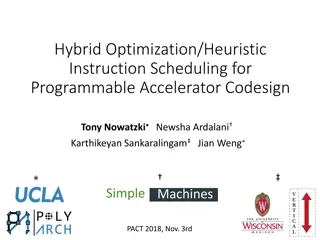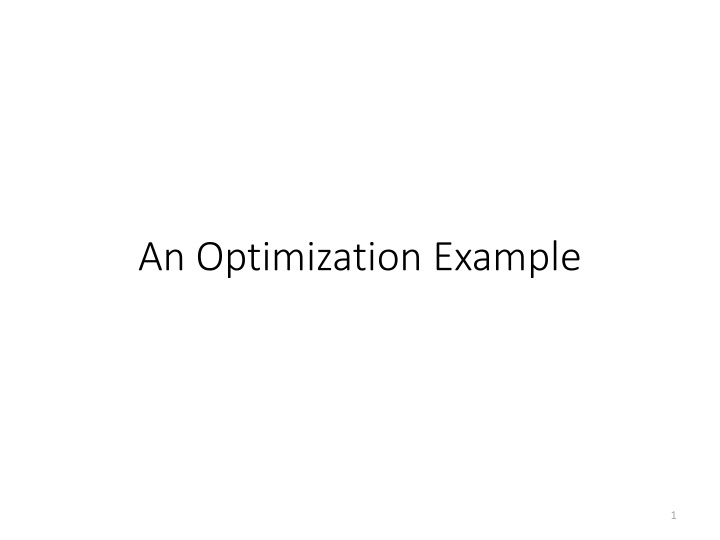
Optimization Examples and Quicksort in Algorithms
Explore optimization examples and the Quicksort algorithm in computer science, illustrated with code snippets and images. Learn about three-address code and local transformations within algorithms.
Download Presentation

Please find below an Image/Link to download the presentation.
The content on the website is provided AS IS for your information and personal use only. It may not be sold, licensed, or shared on other websites without obtaining consent from the author. If you encounter any issues during the download, it is possible that the publisher has removed the file from their server.
You are allowed to download the files provided on this website for personal or commercial use, subject to the condition that they are used lawfully. All files are the property of their respective owners.
The content on the website is provided AS IS for your information and personal use only. It may not be sold, licensed, or shared on other websites without obtaining consent from the author.
E N D
Presentation Transcript
Roadmap Last time Path problems Shortest-distance problem Started on concrete semantics Showing you the how, but not the why Today: the why Via an optimization example 2
Quicksort* void quicksort(int m, int n) { int i, j, v, x; if (n <= m) return; i = m-1; j = n; v = a[n]; while(1) { do i = i+1; while (a[i] < v); do j = j-1; while (a[j] > v); if (i >= j) break; x = a[i]; a[i] = a[j]; a[j] = x; } x = a[i]; a[i] = a[n]; a[n] = x; quicksort(m,j); quicksort(i+1,n); } 3 *Example from Aho, Sethi, Ullman, Compilers: Principles, Techniques, and Tools, Addison-Wesley, 1986
Three-address code (IR) Roughly: assembly code but an unbounded number of registers no explicit manipulation of the stack, ARs, etc. Types of 3-address statements x := y copy statements x := op y unary op x := y op z binary op x := y[i] indexed fetch x[i] := y indexed copy goto P goto x := &y assign address x := *y assign indirect *x := y store indirect if x relop y goto P if-then param x1; param x2; ; param xn; call p,n call return y return 4
Three-address code (IR) Assign t1 := -c t2 := b * t1 t3 := -c t4 := b * t3 t5 := t2 + t4 a := t5 Id[a] t5 Plus t2 t4 Times Times Id[b] t1 t3 Id[b] UMinus UMinus Id[c] Id[c] 5
1) i := m-1 2) j := n 3) t1 := 4*n 4) v := a[t1] Quicksort 5) i := i+1 6) t2 := 4*i 7) t3 := a[t2] 8) if t3 < v goto (5) void quicksort(int m, int n) { int i, j, v, x; if (n <= m) return; i = m-1; j = n; v = a[n]; while(1) { do i = i+1; while (a[i] < v); do j = j-1; while (a[j] > v); if (i >= j) break; x = a[i]; a[i] = a[j]; a[j] = x; } x = a[i]; a[i] = a[n]; a[n] = x; quicksort(m,j); quicksort(i+1,n); } 9) j := j-1 10) t4 := 4*j 11) t5 :- a[t4] 12) if t5 > v goto (9) 14) t6 := 4*i 15) x := a[t6] 16) t7 := 4*i 17) t8 := 4*j 18) t9 := a[t8] 19) a[t7] := t9 20) t10 := 4*j 21) a[t10] := x 22) goto (5) 13) if i >= j goto (23) 23) t11 := 4*i 24) x := a[t11] 25) t12 := 4*i 26) t13 := 4*n 27) t14 := a[t13] 28) a[t12] = t14 29) t15 := 4*n 30) a[t15] := x 6
Scope of transformations Local transformations within a single basic block Intraprocedural transformations within a single procedure Interprocedural transformation across procedure boundaries 7
Kinds of optimizing transformations Remove redundant or useless computations common-subexpression elimination copy propagation unreachable-code elimination constant folding Loop optimizations code motion (move code outside loop) reduction in strength 8
Regardless of level Loop until done: Analyze program to gather facts Apply transformation Analyze program perform dataflow analysis on the program s CFG More precisely Analyze program to gather facts Loop until done: Apply transformation Update facts to reflect the new state of the code 9
What kinds of analyses? Possible values of variables v is a constant k v points only to vars in set S function pointer f can only hold the address of a procedure in set P label var l can only hold labels in set L can pointer p be NULL at point p? what are upper/lower bounds on the value of x at point p? does x == y hold at point p? Other execution properties var v may/may not be used subsequently (live/dead) value assigned at def-site d: x = may be used at use-site u: x (d reaches u) expression e has always already been computed ( is available ) whenever execution reaches point p can there be any overflows in the computation at point p 10
1) i := m-1 2) j := n 3) t1 := 4*n 4) v := a[t1] 5) i := i+1 6) t2 := 4*i 7) t3 := a[t2] 8) if t3 < v goto (5) 9) j := j-1 10) t4 := 4*j 11) t5 :- a[t4] 12) if t5 > v goto (9) 14) t6 := 4*i 15) x := a[t6] 16) t7 := 4*i 17) t8 := 4*j 18) t9 := a[t8] 19) a[t7] := t9 20) t10 := 4*j 21) a[t10] := x 22) goto (5) 13) if i >= j goto (23) 23) t11 := 4*i 24) x := a[t11] 25) t12 := 4*i 26) t13 := 4*n 27) t14 := a[t13] 28) a[t12] = t14 29) t15 := 4*n 30) a[t15] := x 11
1) i := m-1 2) j := n 3) t1 := 4*n 4) v := a[t1] 5) i := i+1 6) t2 := 4*i 7) t3 := a[t2] 8) if t3 < v goto (5) 9) j := j-1 10) t4 := 4*j 11) t5 :- a[t4] 12) if t5 > v goto (9) 14) t6 := 4*i 15) x := a[t6] 16) 17) t8 := 4*j 18) t9 := a[t8] 19) a[t6] := t9 20) 21) a[t8] := x 22) goto (5) 13) if i >= j goto (23) 23) t11 := 4*i 24) x := a[t11] 25) t12 := 4*i 26) t13 := 4*n 27) t14 := a[t13] 28) a[t12] = t14 29) t15 := 4*n 30) a[t15] := x 12
1) i := m-1 2) j := n 3) t1 := 4*n 4) v := a[t1] 5) i := i+1 6) t2 := 4*i 7) t3 := a[t2] 8) if t3 < v goto (5) 9) j := j-1 10) t4 := 4*j 11) t5 :- a[t4] 12) if t5 > v goto (9) 14) 15) x := t3 16) 17) 18) 19) a[t2] := t5 20) 21) a[t4] := x 22) goto (5) 13) if i >= j goto (23) Copy propagation 23) t11 := 4*i 24) x := a[t11] 25) t12 := 4*i 26) t13 := 4*n 27) t14 := a[t13] 28) a[t12] = t14 29) t15 := 4*n 30) a[t15] := x 13
1) i := m-1 2) j := n 3) t1 := 4*n 4) v := a[t1] x always defined before (re)used 5) i := i+1 6) t2 := 4*i 7) t3 := a[t2] 8) if t3 < v goto (5) x is dead 9) j := j-1 10) t4 := 4*j 11) t5 :- a[t4] 12) if t5 > v goto (9) 14) 15) x := t3 16) 17) 18) 19) a[t2] := t5 20) 21) a[t4] := t3 22) goto (5) 13) if i >= j goto (23) 23) t11 := 4*i 24) x := a[t11] 25) t12 := 4*i 26) t13 := 4*n 27) t14 := a[t13] 28) a[t12] = t14 29) t15 := 4*n 30) a[t15] := x 14
1) i := m-1 2) j := n 3) t1 := 4*n 4) v := a[t1] 5) i := i+1 6) t2 := 4*i 7) t3 := a[t2] 8) if t3 < v goto (5) 9) j := j-1 10) t4 := 4*j 11) t5 :- a[t4] 12) if t5 > v goto (9) 14) 15) 16) 17) 18) 19) a[t2] := t5 20) 21) a[t4] := t3 22) goto (5) 13) if i >= j goto (23) 23) t11 := 4*i 24) x := a[t11] 25) t12 := 4*i 26) t13 := 4*n 27) t14 := a[t13] 28) a[t12] = t14 29) t15 := 4*n 30) a[t15] := x 15
Dead-code elimination A variable is live at a point p if its value can be used subsequently. A variable that is not live is dead. Idea: remove assignments to dead variables p: x := x is live just after p if goto q q: r: x x := 16
1) i := m-1 2) j := n 3) t1 := 4*n 4) v := a[t1] Reduction in strength: replace * with + E.g., replace j := j-1 t4 := 4*j with j := j-1 t4 := t4 - 4 5) i := i+1 6) t2 := 4*i 7) t3 := a[t2] 8) if t3 < v goto (5) 9) j := j-1 10) t4 := 4*j 11) t5 :- a[t4] 12) if t5 > v goto (9) 14) 15) 16) 17) 18) 19) a[t2] := t5 20) 21) a[t4] := t3 22) goto (5) 13) if i >= j goto (23) 23) t11 := 4*i 24) x := a[t11] 25) t12 := 4*i 26) t13 := 4*n 27) t14 := a[t13] 28) a[t12] = t14 29) t15 := 4*n 30) a[t15] := x 17
1) i := m-1 2) j := n 3) t1 := 4*n 4) v := a[t1] Reduction in strength: replace * with + E.g., replace j := j-1 t4 := 4*j with j := j-1 t4 := t4 - 4 5) i := i+1 6) t2 := 4*i 7) t3 := a[t2] 8) if t3 < v goto (5) t4 := 4*j 9) j := j-1 10) t4 := t4 - 4 11) t5 :- a[t4] 12) if t5 > v goto (9) 14) 15) 16) 17) 18) 19) a[t2] := t5 20) 21) a[t4] := t3 22) goto (5) 13) if i >= j goto (23) 23) t11 := 4*i 24) x := a[t11] 25) t12 := 4*i 26) t13 := 4*n 27) t14 := a[t13] 28) a[t12] = t14 29) t15 := 4*n 30) a[t15] := x 18
i := m-1 j := n t1 := 4*n v := a[t1] t2 := 4*i t4 := 4*j 1) 2) 3) 4) i := m-1 j := n t1 := 4*n v := a[t1] 5) 6) 7) 8) i := i+1 t2 := 4*i t3 := a[t2] if t3 < v goto (5) t2 := t2+4 t3 := a[t2] if t3 < v goto (5) 9) 10) 11) 12) j := j-1 t4 := 4*j t5 :- a[t4] if t5 > v goto (9) t4 := t4 - 4 t5 :- a[t4] if t5 > v goto (9) 14) 15) 16) 17) 18) 19) 20) 21) 22) t6 := 4*i x := a[t6] t7 := 4*i t8 := 4*j t9 := a[t8] a[t7] := t9 t10 := 4*j a[t10] := x goto (5) a[t2] := t5 a[t4] := t3 goto (5) 13) if i >= j goto (23) if t2 >= t4 goto (23) 23) 24) 25) 26) 27) 28) 29) 30) t11 := 4*i x := a[t11] t12 := 4*i t13 := 4*n t14 := a[t13] a[t12] = t14 t15 := 4*n a[t15] := x t14 := a[t1] a[t2] = t14 a[t1] := t3





